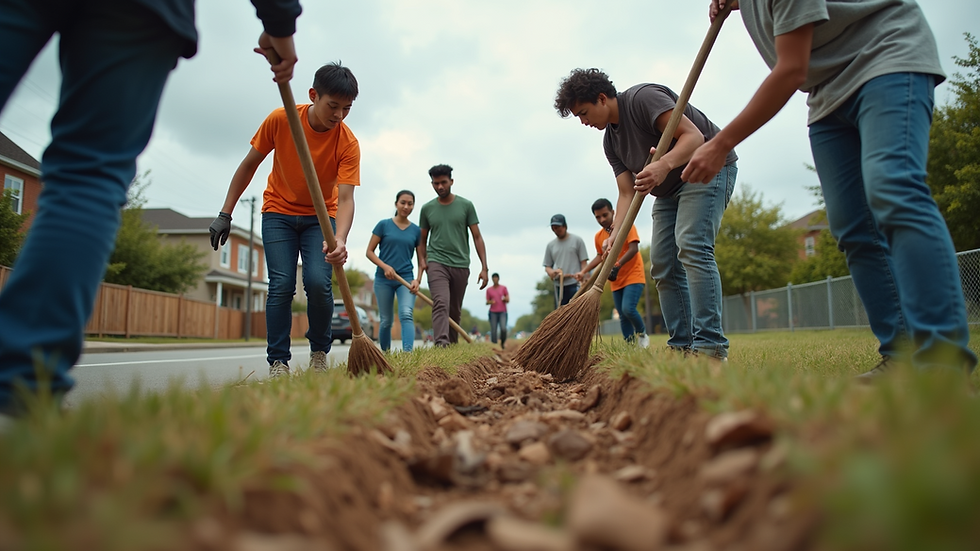Supporting Homeless Veterans: A Community Responsibility
- evportia1
- Sep 8, 2025
- 4 min read
Every day, countless veterans return home after serving our country. They have faced challenges that most of us can only imagine. Yet, despite their sacrifices, many of these brave individuals find themselves without a place to call home. Supporting homeless veterans is not just a duty; it is a community responsibility that we all share.
In this blog post, we will explore the reasons behind veteran homelessness, the impact it has on our communities, and how we can come together to support those who have served us.
Understanding Veteran Homelessness
Homelessness among veterans is a complex issue. Many factors contribute to this crisis, including mental health challenges, substance abuse, and a lack of affordable housing.
According to the U.S. Department of Housing and Urban Development, on any given night, approximately 37,000 veterans are homeless. This number is staggering, especially when we consider the sacrifices these individuals have made for our freedom.
Mental Health Challenges
Many veterans face mental health issues, such as PTSD (Post-Traumatic Stress Disorder). These challenges can make it difficult for them to reintegrate into civilian life.
PTSD: This condition can lead to anxiety, depression, and difficulties in maintaining relationships.
Substance Abuse: Some veterans turn to drugs or alcohol as a way to cope with their pain.
These issues can create a cycle that is hard to break, leading to homelessness.
Economic Factors
The economy also plays a significant role in veteran homelessness.
Job Market: Many veterans struggle to find jobs that match their skills.
Affordable Housing: The rising cost of living makes it difficult for veterans to secure stable housing.
These economic challenges can push veterans into homelessness, leaving them without the support they need.
The Impact on Communities
Homelessness among veterans affects not only the individuals but also the communities they live in.
Social Stigma
There is often a stigma associated with homelessness. Many people may view homeless veterans as lazy or unmotivated. This perception can lead to a lack of support and understanding from the community.
Economic Costs
Communities also bear the economic burden of homelessness.
Healthcare Costs: Homeless veterans often require more medical care, which can strain local resources.
Public Safety: Increased homelessness can lead to higher crime rates, affecting the overall safety of the community.
By addressing veteran homelessness, we can create a healthier and safer environment for everyone.
How We Can Help
Supporting homeless veterans is a responsibility that we all share. Here are some practical ways to make a difference in your community.
Volunteer Your Time
One of the most impactful ways to help is by volunteering.
Local Shelters: Many shelters specifically cater to veterans. Volunteering your time can provide much-needed support.
Food Drives: Organizing or participating in food drives can help ensure that veterans have access to nutritious meals.
Every little bit helps, and your time can make a significant difference.
Donate Resources
If you are unable to volunteer, consider donating resources.
Clothing: Many veterans need warm clothing, especially during the winter months.
Household Items: Donating household items can help veterans transition into stable housing.
Your donations can provide comfort and support to those in need.
Advocate for Change
Advocacy is another powerful way to support homeless veterans.
Raise Awareness: Use social media to share information about veteran homelessness.
Contact Local Representatives: Encourage your local government to allocate resources for veteran support programs.
By advocating for change, you can help create a more supportive environment for veterans.
Community Programs Making a Difference
Many organizations are dedicated to helping homeless veterans. Here are a few examples of programs that are making a significant impact.
The National Coalition for Homeless Veterans
This organization works to end homelessness among veterans. They provide resources, training, and support to local organizations.
Volunteers of America
Volunteers of America offers a variety of services for veterans, including housing assistance and job training. Their programs are designed to help veterans reintegrate into society successfully.
The U.S. Department of Veterans Affairs
The VA provides numerous resources for veterans, including housing assistance and mental health services. They are committed to ensuring that no veteran is left behind.
The Role of Local Businesses
Local businesses can also play a crucial role in supporting homeless veterans.
Employment Opportunities
By hiring veterans, businesses can help them regain their independence.
Job Training Programs: Offering job training can equip veterans with the skills they need to succeed in the workforce.
Flexible Hours: Providing flexible work hours can help veterans manage their personal challenges while earning a living.
Community Partnerships
Businesses can partner with local organizations to support veterans.
Sponsorships: Sponsoring events that raise awareness about veteran homelessness can help bring the community together.
Fundraising: Organizing fundraising events can provide much-needed resources for local veteran support programs.
Building a Supportive Community
Creating a supportive community for homeless veterans requires collective effort.
Education and Awareness
Educating the community about the challenges veterans face is essential.
Workshops: Hosting workshops can help raise awareness and dispel myths about homelessness.
Community Events: Organizing events that celebrate veterans can foster a sense of community and support.
Encouraging Empathy
Encouraging empathy is vital in changing perceptions about homeless veterans.
Storytelling: Sharing personal stories of veterans can humanize their experiences and foster understanding.
Community Dialogues: Hosting discussions can provide a platform for veterans to share their challenges and triumphs.
A Call to Action
Supporting homeless veterans is a responsibility that we all share. It is essential to recognize the sacrifices these individuals have made for our freedom.
By coming together as a community, we can create a supportive environment that helps veterans transition back into society.
Take the First Step
If you are unsure where to start, consider reaching out to local organizations that support veterans.
Volunteer: Find a local shelter or organization that needs help.
Donate: Gather items to donate or contribute financially to support veteran programs.
Every action counts, no matter how small.
Together, We Can Make a Difference
In conclusion, supporting homeless veterans is not just a task for a few; it is a collective responsibility. By understanding the challenges they face and taking action, we can create a community that honors their sacrifices.
Let us work together to ensure that every veteran has a place to call home.

By fostering empathy, raising awareness, and providing resources, we can help our veterans find stability and support. Together, we can make a lasting impact on the lives of those who have served our country.



Comments